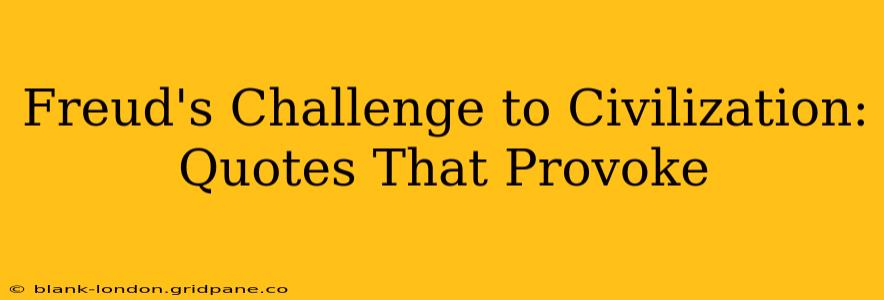Sigmund Freud, the father of psychoanalysis, wasn't just a theorist; he was a cultural provocateur. His ideas, often unsettling and counterintuitive, challenged the very foundations of Western civilization. He dared to explore the darker recesses of the human psyche, revealing the inherent conflict between our primal instincts and the demands of societal order. This exploration, reflected in his numerous works, continues to resonate today, forcing us to confront uncomfortable truths about ourselves and our societies. Let's delve into some of Freud's most provocative quotes and unpack their lasting impact.
The Unconscious: A Battlefield of Instinct and Reason
Freud's groundbreaking concept of the unconscious – the hidden reservoir of thoughts, feelings, and memories influencing our conscious behavior – fundamentally altered our understanding of human nature. This internal battleground, a constant negotiation between primal drives (the id) and the demands of societal norms (the superego), is central to his critique of civilization.
"Civilization obtains mastery over the individual's dangerous desire for aggression by weakening and disarming it and setting up an agency within him to watch over it, like a garrison in a conquered city." This quote encapsulates Freud's view of civilization as a fragile construct, constantly battling against our inherent aggression. He saw societal structures, laws, and moral codes as mechanisms to suppress our destructive impulses, a necessary but ultimately precarious arrangement. The "garrison" represents our conscience, the internalized societal norms that restrain our aggressive tendencies.
The Price of Progress: Repression and Sublimation
Freud argued that the progress of civilization necessitates the repression of our natural instincts, particularly aggression and sexuality. This repression, while essential for social cohesion, comes at a psychological cost. He posited that sublimating these instincts – channeling them into socially acceptable activities like art, science, or religion – is a crucial mechanism for maintaining both individual and societal well-being. However, he also acknowledged the potential for this repression to lead to neurosis and other psychological disturbances.
"The price we pay for our advance in civilization is a loss of happiness through the increase of suffering." This quote highlights the inherent tension between societal progress and individual contentment. Freud suggests that the very structures designed to protect us and foster civilization also lead to psychological suffering by demanding we repress fundamental aspects of our nature. This isn't a simple equation; the suffering is not necessarily a direct result of repression, but rather a consequence of the internal conflict it generates.
What are the key aspects of Freud's theory of civilization?
Freud's theory of civilization centers on the inherent conflict between the individual's instinctual drives (primarily aggression and sexuality) and the demands of societal order. He argued that civilization necessitates the repression of these drives, leading to a constant tension between individual gratification and societal norms. This repression, he believed, was a necessary trade-off for social progress, but one that inevitably results in psychological costs for the individual. Key aspects include the development of the superego (conscience), the mechanisms of defense, and the sublimation of instinctual drives into socially acceptable activities.
What are the psychological consequences of repressing our instincts according to Freud?
According to Freud, repressing our instincts, particularly aggression and sexuality, can lead to various psychological consequences. These can include neuroses, anxieties, and other psychological disturbances. The build-up of repressed energy can manifest in various ways, such as displacement onto less threatening targets or the development of defense mechanisms. The resulting internal conflict creates a sense of unease and dissatisfaction, underscoring the inherent tension between individual desires and societal demands in Freud's theory.
How does Freud view the role of aggression in society?
Freud considered aggression an inherent part of human nature, an instinctual drive as powerful as sexuality. He argued that civilization's success depends on channeling and controlling this aggression, rather than eliminating it entirely. The mechanisms of societal control, including laws, morality, and social structures, serve to regulate and redirect aggressive impulses, preventing the destructive potential of unchecked aggression. This doesn't mean eliminating aggression entirely, but rather managing it in a way that enables social cohesion.
Beyond Repression: The Role of Love and Eros
While acknowledging the pervasive influence of aggression, Freud didn't solely focus on the destructive aspects of human nature. He also emphasized the importance of Eros, the life instinct, encompassing love, creativity, and the drive for self-preservation. The interplay between Eros and Thanatos (the death instinct) shapes the individual's and society's trajectory.
"The decisive factor is the strength of Eros in relation to the forces of destruction." This quote points to the precarious balance between our destructive and constructive impulses. The dominance of Eros can lead to progress and cooperation, while the unchecked influence of Thanatos threatens societal collapse. The ongoing conflict between these two forces is a continual struggle within individuals and within society itself.
The Enduring Legacy of Freud's Provocation
Freud's challenging ideas continue to provoke debate and inspire further exploration of the human condition. His insights into the unconscious, the dynamics of aggression, and the psychological cost of civilization remain relevant and impactful, prompting critical self-reflection on the nature of both the individual and society. His work forces us to confront uncomfortable truths, pushing us towards a deeper and more nuanced understanding of ourselves and the world we inhabit. The provocative nature of his quotes serves as a reminder of the enduring relevance of his thought in a world still grappling with the challenges he so presciently identified.

